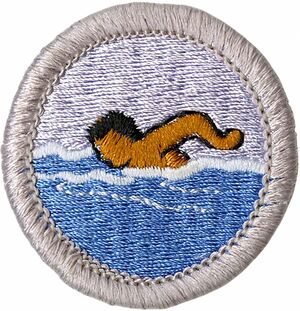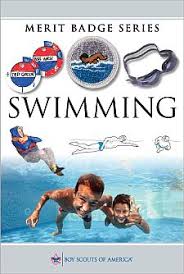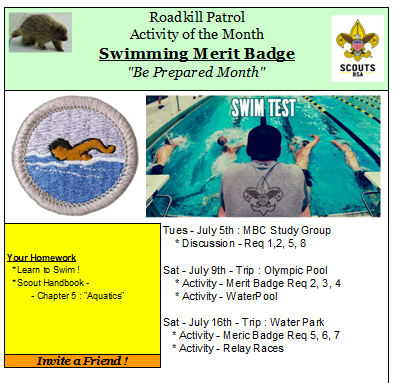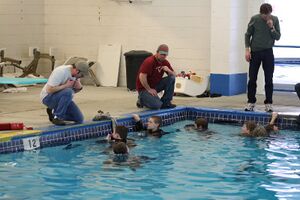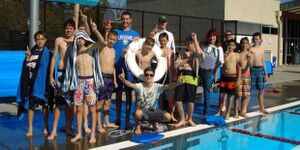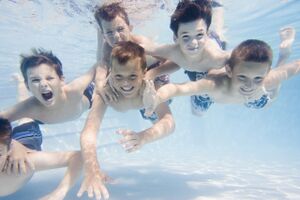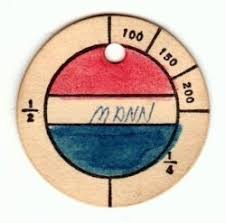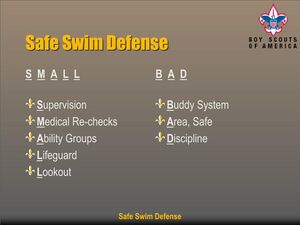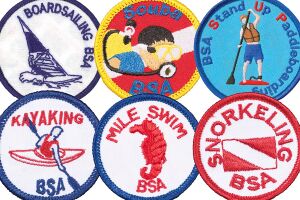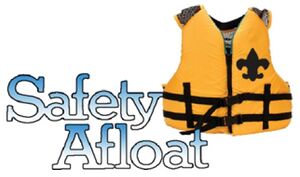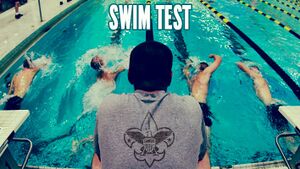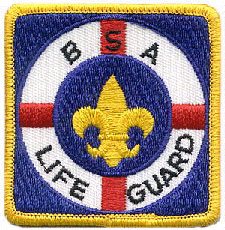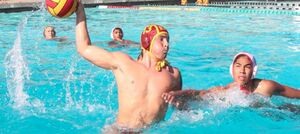Swimming Merit Badge Activity Planner
| Swimming is the 2nd most popular merit badge activity in scouting and while most scouts earn this one at summer camp you can certainly work on this one as a patrol any other time of the year. |
|---|
'Patrol Leader Merit Badge Planning Guide for the Swimming Merit Badge
*** Activities for the Youth Lead Patrol ***
Exploring Swimming can be a fascinating youth adventure when done right. Here are a few tips to help the patrol leader get started.
- Scouts may never add or subtract from the actual merit badge requirements
- This Planner is only a suggestion of different ideas to make working this Merit Badge both fun and easy.
- While doing the Worksheet is not a requirement for earning this badge, in many cases it can help you learn key concepts and track your progress.
A. Make Your Plan
- Merit Badge Activity Planning Tips - 14 tips for a successful patrol activity. Read carefully before you start your plan!
- Share Your Plan - Meet ahead of time with your patrol, scout leaders, parents and especially with the Merit Badge Counselor. Make changes to the plan as needed.
- Prepare Activity Flyer - Keep your fellow scouts informed - events, activities, pre-requisites and more.
| Patrol Activity | GREAT | Awesome MB to work as a patrol / Max Size 12 scouts |
|---|---|---|
| Virtual Field Trip | POOR | Physical presence at Pool Facility |
| Family Activity | FAIR | Learn to Swim |
| Service Activity | FAIR | Pool cleaning / prep for water rescues and safety |
| S.T.E.M. Activity | POOR | n/a |
| Field Trip | GREAT | Pool trip required / explore great pools in community |
| Duty-to-God | POOR | n/a |
| MB Day | FAIR | Only if done at swimming pool. Must pass Swim test |
| Overnighter | GREAT | Pool trip required / explore great pools in community |
| Summer Camp | GREAT | Most popular summer camp program! Must pass Swim test |
Online Resources
- Swimming Merit Badge Requirements: BoyScoutTrial.com lists all requirements, additional resources, activity worksheet, etc.
- Swimming Merit Badge File Store: Online resources
- Swimming Merit Badge Worksheets: Worksheets are optional - but highly preferred by many MBC. When you find that many requirements say "discuss" - the worksheet can help you gather your thoughts beforehand.
- Swimming Merit Badge Booklet: Everything thing you need to know about Swimming is right here. Get this study guide from either Amazon or your Troop Library, Merit Badge Counselor or Scoutmaster to Learn More About this Subject.
- Swimming @ Simple-Wikipedia: Get the basics quickly.
B. Introduction Meeting
Send out the activity flyer in advance to use as an meeting agenda. Your scouts will then know what to expect.
News Flash
C. Homework / Prerequisites
1. Every scout should already know the basics of swimming. If not then they should partake in a "Learn to Swim" class with a qualified instructor.
2. This merit badge activity requires access to a large swimming pool. Consult with your MBC or spend the weekend at a BSA Scout Camp.
3. For the typical patrol (4-10 scouts) you should find that there is plenty for everyone to become fully "immersed" in the activity and to have fun.
Learn to Swim
- Read "Scout Handbook" - Chapter 5 - "Aquatics"
- Learn to Swim for Beginners - YouTube Starter Tutorial - LEARN to SWIM & FLOAT for BEGINNERS (easy tutorial)
- Learn to Swim for GrownUps Afraid of the Water - YouTube Starter Tutorial - In this video, coach Mike will teach us how to swim. Balaji is an adult beginner afraid of the water. After almost drowning in a lake last summer, he reached out to me (Jonny Nitro – creator) asking if we could teach him. If you follow the steps laid out here by Coach Mike in this video, then you too can learn how to swim! (10 Video series)
- Learn How to Dive for Swimming - YouTube Starter Tutorial -
- BSA Safe Swim Defense - Scouting Multimedia Service
BSA Swim Test
All scouts should have already passed both BSA Swim Tests even before starting work on this merit badge !!!
- 2nd Class Scout Req #5: Swim Test & Safety Afloat Discussion
- 1st Class Scout Req #6: Swim Test & Water Rescue Basics
Req #2: "BSA Swimmer Test: Jump feet first into water over the head in depth. Level off and swim 75 yards in a strong manner using one or more of the following strokes: sidestroke, breaststroke, trudgen, or crawl; then swim 25 yards using an easy, resting backstroke. The 100 yards must be completed in one swim without stops and must include at least one sharp turn. After completing the swim, rest by floating."
D. Study Hall Patrol Night
While some scouts may be adept at self-study, others may do better in a small group setting and taking notes on worksheets. Make an agenda. You can facilitate discussion by asking them why each of the principles introduced here would be relevant. Schedule one or more patrol meetings to work this merit badge.
MBC Discussion Group
- Req 1a: Discussion - Safe Swim Defence
- Req 1b: Discussion - Swimming First Aid
- Req 5d: Discussion - Hypothermia Onset in Cold Water
- Req 8: Discussion - Benefits of Swimming
Discussion Resources:
- Scout Handbook- Ch 5 : "Aquatics"
Pre-Open Gathering Activity
A gathering activity before the official meeting start is a great way to set a fun theme for the meeting.
- Understanding and Passing the BSA Swimmer Test - To be allowed into the water during any official Scouting function, it’s required that every scout pass the BSA Swimmer’s test.
E. Swimming Pool Demonstration
Req #3 : Swim Activity
Swim continuously for 150 yards using the following strokes in good form and in a strong manner: front crawl or trudgen for 25 yards, back crawl for 25 yards, sidestroke for 25 yards, breaststroke for 25 yards, and elementary backstroke for 50 yards.
Req #4a : Water Rescue A
Demonstrate water rescue methods by reaching with your arm or leg, by reaching with a suitable object, and by throwing lines and objects. Explain why swimming rescues should not be attempted when a reaching or throwing rescue is possible, and explain why and how a rescue swimmer should avoid contact with the victim.
Req #4b : Water Rescue B
With a helper and a practice victim, show a line rescue both as tender and as rescuer. The practice victim should be approximately 30 feet from shore in deep water.
Req #5: Survival Floating
Do the following:
- Float faceup in a resting position for at least one minute.
- Demonstrate survival floating for at least five minutes.
- While wearing a properly fitted U.S. Coast Guard-approved life jacket, demonstrate the HELP and huddle positions. Explain their purposes.
Req #6: Diving Part A
In water over your head, but not to exceed 10 feet, do each of the following:
- Use the feet first method of surface diving and bring an object up from the bottom.
- Do a headfirst surface dive (pike or tuck), and bring the object up again.
- Do a headfirst surface dive to a depth of at least 5 feet and swim underwater for three strokes. Come to the surface, take a breath, and repeat the sequence twice.
Req #7: Diving Part B
Following the guidelines set in the BSA Safe Swim Defense, in water at least 7 feet deep*, show a standing headfirst dive from a dock or pool deck. Show a long shallow dive, also from the dock or pool deck.
- If your state, city, or local community requires a water depth greater than 7 feet, it is important to abide by that mandate.
F. Extra Credit
While none of these are actual requirements for this merit badge - they are terrific opportunities to show Scout Spirit, Do A Good Turn Daily and to have FUN!
- Activity Reflection: Use this meeting for scouts to ask questions and to reflect on what they gained personally from this adventure. You can also have a discussion on what future opportunities are here.
- Court of Honor Exhibit: Pictures, handiwork and other memorabilia from this adventure will make for a great presentation at the next Scout Troop Court of Honor.
Swimming Field Trips
You can do some or all requirements at a unique swimming pool:
- Ask your MBC or Scout Leaders about unique large public/private swimming pools in your area.
- Plan an overnight scout trip to the local council scout camp and ask to use their swimming pool for the weekend.
Pool Games : Water Polo
Story #1: One evening, after doing the scout swim tests, our "Roadkill Patrol" started up a game of water polo. It was such fun that several of the scouts later signed up to play water polo in high school. They participated in several major swimming and water polo competitions.
Related Merit Badges
Sometimes it is easier by doing two or more merit badges together as a joint activity:
G. See Also
- 9 Things to Know about Merit Badges - BoysLife.org - There are more than 135 merit badges. By earning them, you can learn about sports, crafts, science, trades, business, and future careers. Here’s how to get the most out of your merit badge experience.

